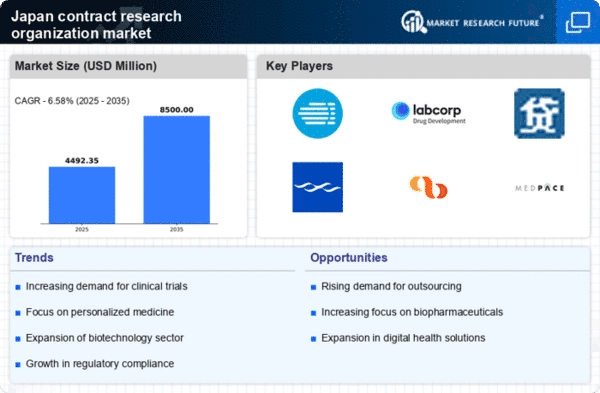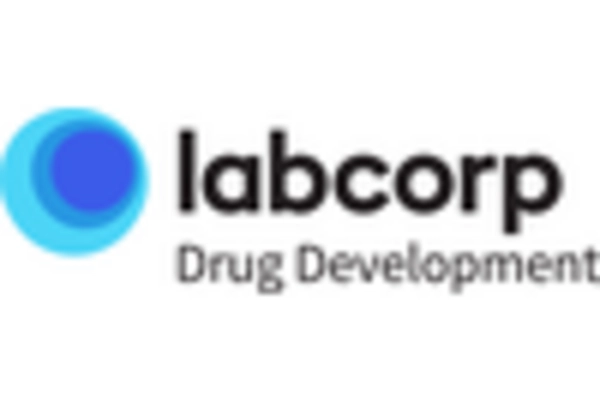Expansion of Regulatory Frameworks
The evolving regulatory landscape in Japan is playing a crucial role in shaping the contract research-organization market. Recent updates to regulatory frameworks have streamlined the approval processes for new drugs and therapies, thereby encouraging pharmaceutical companies to engage with contract research organizations. The Pharmaceuticals and Medical Devices Agency (PMDA) has introduced measures aimed at expediting clinical trial approvals, which is expected to enhance the overall efficiency of drug development. As a result, the contract research-organization market is likely to benefit from increased demand for services that facilitate compliance with these new regulations. This expansion of regulatory frameworks not only fosters innovation but also positions Japan as an attractive destination for clinical research, further driving the growth of the contract research-organization market.
Rising Investment in Biopharmaceuticals
The contract research-organization market in Japan is experiencing a notable surge in investment, particularly within the biopharmaceutical sector. This trend is driven by the increasing demand for innovative therapies and personalized medicine. In 2025, the biopharmaceutical market in Japan is projected to reach approximately $50 billion, indicating a robust growth trajectory. As pharmaceutical companies seek to expedite drug development processes, they are increasingly outsourcing clinical trials and research activities to contract research organizations. This shift not only enhances efficiency but also allows companies to leverage specialized expertise, thereby fostering a competitive edge in the market. Consequently, the rising investment in biopharmaceuticals is a significant driver for the contract research-organization market, as it creates a favorable environment for collaboration and innovation.
Growing Focus on Patient-Centric Approaches
In recent years, the contract research-organization market has seen a growing emphasis on patient-centric approaches in clinical trials. This shift is largely influenced by the need to enhance patient engagement and improve trial outcomes. Organizations are increasingly adopting strategies that prioritize patient needs, such as flexible trial designs and the incorporation of real-world evidence. In Japan, approximately 70% of clinical trials are now designed with patient input, reflecting a significant transformation in the research landscape. This focus on patient-centricity not only improves recruitment and retention rates but also aligns with regulatory expectations, thereby driving the demand for contract research organizations that can effectively implement these strategies. As a result, the growing focus on patient-centric approaches is a key driver for the contract research-organization market.
Technological Integration in Research Processes
The integration of advanced technologies into research processes is significantly influencing the contract research-organization market in Japan. Technologies such as artificial intelligence (AI), machine learning, and big data analytics are being increasingly utilized to enhance the efficiency and accuracy of clinical trials. In 2025, it is estimated that over 40% of contract research organizations in Japan will adopt AI-driven solutions to optimize trial designs and patient recruitment. This technological integration not only streamlines operations but also reduces costs, making it an appealing option for pharmaceutical companies. As organizations seek to leverage these technologies to improve outcomes and accelerate timelines, the contract research-organization market is poised for substantial growth driven by this trend.
Increased Collaboration with Academic Institutions
The contract research-organization market in Japan is witnessing a rise in collaboration between contract research organizations and academic institutions. This trend is driven by the need for innovative research and the development of cutting-edge therapies. Academic institutions often possess unique expertise and resources that can complement the capabilities of contract research organizations. In 2025, it is projected that collaborations between these entities will increase by approximately 30%, fostering a more dynamic research environment. Such partnerships not only enhance the quality of research but also facilitate access to funding opportunities and shared resources. Consequently, the increased collaboration with academic institutions serves as a vital driver for the contract research-organization market, promoting innovation and advancing the overall research agenda.
















